Demetrius
On this page, you find all documents, package deals, and flashcards offered by seller Demetrius.
- 4555
- 0
- 168
Community
- Followers
- Following
81 Reviews received
4725 items
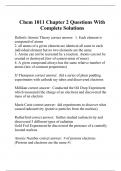
Chem 1011 Chapter 2 Questions With Complete Solutions
Dalton's Atomic Theory correct answer: 1. Each element is composed of atoms 2. all atoms of a given element are identical all same in each individual element but no two elements are the same 3. Atoms can not be recreated by a reaction. Atoms can not be created or destroyed (law of conservation of mass) 4. A given compound always has the same relative number of atoms (law of constant proportions) JJ Thompson correct answer: did a series of plum pudding experiments with cathode ray tubes ...
- Package deal
- Exam (elaborations)
- • 2 pages •
Dalton's Atomic Theory correct answer: 1. Each element is composed of atoms 2. all atoms of a given element are identical all same in each individual element but no two elements are the same 3. Atoms can not be recreated by a reaction. Atoms can not be created or destroyed (law of conservation of mass) 4. A given compound always has the same relative number of atoms (law of constant proportions) JJ Thompson correct answer: did a series of plum pudding experiments with cathode ray tubes ...
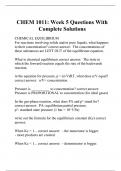
CHEM 1011: Week 5 Questions With Complete Solutions
CHEM 1011: Week 5 Questions With Complete Solutions
- Package deal
- Exam (elaborations)
- • 2 pages •
CHEM 1011: Week 5 Questions With Complete Solutions
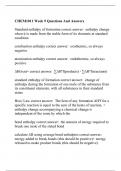
CHEM1011 Week 9 Questions And Answers
Standard enthalpy of formation correct answer: enthalpy change when it is made from the stable form of its elements at standard condition combustion enthalpy correct answer: exothermic, so always negative atomisation enthalpy correct answer: endothermic, so always positive ∆H(rxn)= correct answer: ∑∆Hºf(products) - ∑∆Hºf(reactants) standard enthalpy of formation correct answer: change of enthalpy during the formation of one mole of the substance from its constituent ...
- Package deal
- Exam (elaborations)
- • 3 pages •
Standard enthalpy of formation correct answer: enthalpy change when it is made from the stable form of its elements at standard condition combustion enthalpy correct answer: exothermic, so always negative atomisation enthalpy correct answer: endothermic, so always positive ∆H(rxn)= correct answer: ∑∆Hºf(products) - ∑∆Hºf(reactants) standard enthalpy of formation correct answer: change of enthalpy during the formation of one mole of the substance from its constituent ...
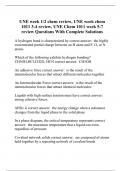
UNE week 1/2 chem review, UNE week chem 1011 3-4 review, UNE Chem 1011 week 5-7 review Questions With Complete Solutions
UNE week 1/2 chem review, UNE week chem 1011 3-4 review, UNE Chem 1011 week 5-7 review Questions With Complete Solutions
- Package deal
- Exam (elaborations)
- • 9 pages •
UNE week 1/2 chem review, UNE week chem 1011 3-4 review, UNE Chem 1011 week 5-7 review Questions With Complete Solutions
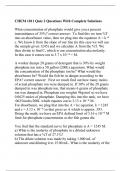
CHEM 1011 Quiz 2 Questions With Complete Solutions
What concentration of phosphate would give you a percent transmittance of 35%? correct answer: To find this we turn %T into an absorbance value, then we plug into the equation A = k * c. We know k from the slope of our line (in this case we will use the sample given 1245) and we calculate A from the %T. We then divide to find C, which is our concentration aka molarity. In this case it comes out to 3.7 x 10⁻⁴ = M. A worker dumps 20 grams of detergent that is 30% by weight phosphate ion in...
- Package deal
- Exam (elaborations)
- • 4 pages •
What concentration of phosphate would give you a percent transmittance of 35%? correct answer: To find this we turn %T into an absorbance value, then we plug into the equation A = k * c. We know k from the slope of our line (in this case we will use the sample given 1245) and we calculate A from the %T. We then divide to find C, which is our concentration aka molarity. In this case it comes out to 3.7 x 10⁻⁴ = M. A worker dumps 20 grams of detergent that is 30% by weight phosphate ion in...
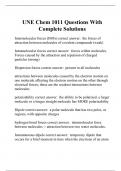
UNE Chem 1011 Questions With Complete Solutions
UNE Chem 1011 Questions With Complete Solutions
- Package deal
- Exam (elaborations)
- • 24 pages •
UNE Chem 1011 Questions With Complete Solutions
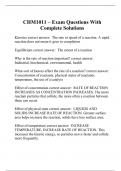
CHM1011 – Exam Questions With Complete Solutions
Kinetics correct answer: The rate or speed of a reaction. A rapid reaction does not mean it goes to completion Equilibrium correct answer: The extent of a reaction Why is the rate of reaction important? correct answer: Industrial, biochemical, environmental, health What sort of factors effect the rate of a reaction? correct answer: Concentration of reactants, physical states of reactants, temperature, the use of a catalyst Effect of concentration correct answer: RATE OF REACTION...
- Package deal
- Exam (elaborations)
- • 21 pages •
Kinetics correct answer: The rate or speed of a reaction. A rapid reaction does not mean it goes to completion Equilibrium correct answer: The extent of a reaction Why is the rate of reaction important? correct answer: Industrial, biochemical, environmental, health What sort of factors effect the rate of a reaction? correct answer: Concentration of reactants, physical states of reactants, temperature, the use of a catalyst Effect of concentration correct answer: RATE OF REACTION...
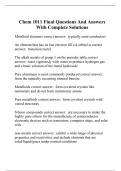
Chem 1011 Final Questions And Answers With Complete Solutions
Chem 1011 Final Questions And Answers With Complete Solutions
- Package deal
- Exam (elaborations)
- • 10 pages •
Chem 1011 Final Questions And Answers With Complete Solutions
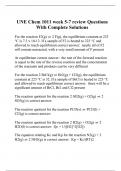
UNE Chem 1011 week 5-7 review Questions With Complete Solutions
For the reaction F2(g) ⇌ 2 F(g), the equilibrium constant at 223 °C is 7.3 x 10-13. If a sample of F2 is heated to 223 °C and allowed to reach equilibrium correct answer: nearly all of F2 will remain unreacted, with a very small amount of F present At equilibrium correct answer: the rate of the forward reaction is equal to the rate of the reverse reaction and the concentration of the reactants and products can be very different For the reaction 2 BrCl(g) ⇌ Br2(g) + Cl2(g), the equi...
- Package deal
- Exam (elaborations)
- • 5 pages •
For the reaction F2(g) ⇌ 2 F(g), the equilibrium constant at 223 °C is 7.3 x 10-13. If a sample of F2 is heated to 223 °C and allowed to reach equilibrium correct answer: nearly all of F2 will remain unreacted, with a very small amount of F present At equilibrium correct answer: the rate of the forward reaction is equal to the rate of the reverse reaction and the concentration of the reactants and products can be very different For the reaction 2 BrCl(g) ⇌ Br2(g) + Cl2(g), the equi...
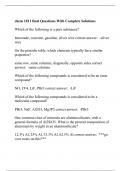
chem 1011 final Questions With Complete Solution
chem 1011 final Questions With Complete Solution
- Package deal
- Exam (elaborations)
- • 11 pages •
chem 1011 final Questions With Complete Solution

Chem 1020 Lab Final Questions With Complete Solutions.
ICC Vapor Recovery 1| 60 Questions| With Complete Solutions
CHEM 120 Chamberlain EXAM 1 Questions With Complete Solutions
EEG board prep ASAP test prep| 650 Questions| With Complete Solutions
ACAS Best Practice Knowledge Exam 1,2,3,4,5 and 6 Questions And Answers With Complete Solutions